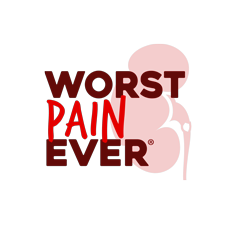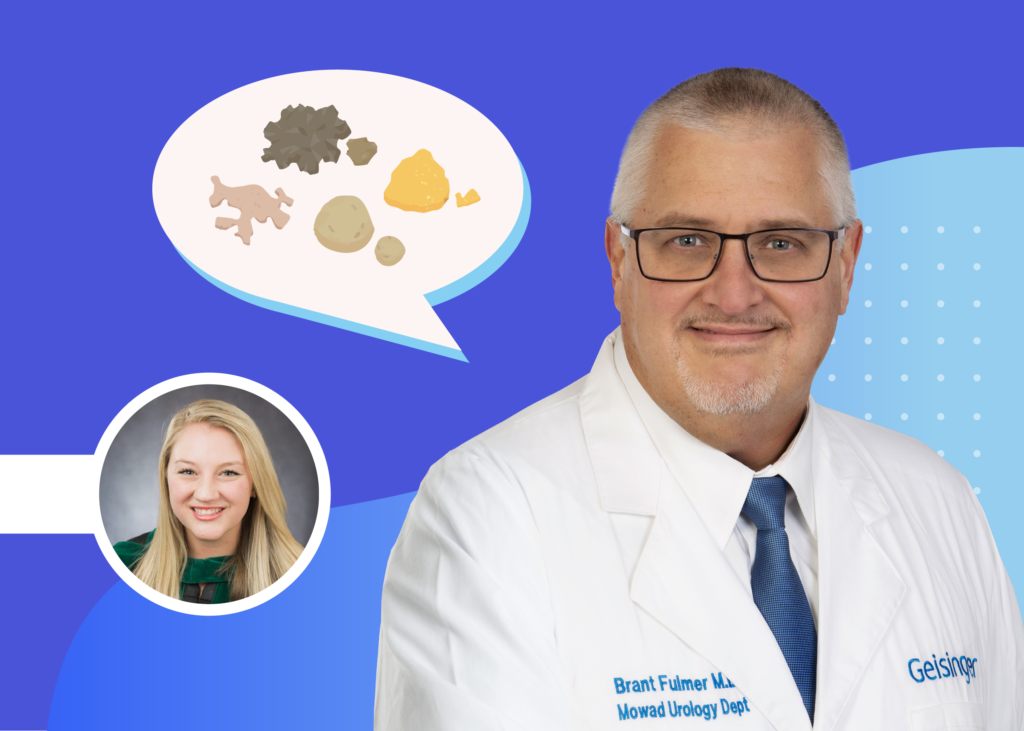If you’ve had to deal with multiple kidney stones, your urologist may have requested that you undergo a stone analysis, and see a nephrologist or dietician. Why do urologists make such recommendations and how do they help? We speak with urologists Dr. Brant Fulmer and Dr. Rebecca Keller from Geisinger to find out more!
How important is it for both patients and urologists to know their stone type?
Dr. Keller:
It’s very important for you and your urologist to know and have a conversation about the kind of stones you make. There are certain things that can be done to prevent stones in the future, depending on the stones you form. If stones run in your family, talk to your urologist about getting a workup to see why you’re making them, so as to try and prevent it in the future.
Finding out your stone type consists of having some blood work and a 24-hour urine collection done, to check things like your calcium levels and kidney function. If you know you’re passing a stone, try catching it and bring it to your urologist to have it analyzed. It can be very helpful in directing your care and give us urologists a more hands-on, active approach to preventing future stones.
Dr. Fulmer:
Your stone composition can change over time. This means that you may have one type of stone at one point in time and another type of stone and another point. There is one variety of stone, uric acid stones, that can be dissolved using urinary alkalinization and by increasing fluid intake. Knowing that you have that type of stone is helpful because it helps to direct you to know what to do next.
Should kidney stone patients request for every stone to be analyzed, or is it part of a standard of care?
Dr. Fulmer:
It is common practice for us to send stones off to the laboratory when we remove stones or when the patient passes a stone. While stone composition can change, it doesn’t change quickly, so we don’t send every stone for analysis. It is worthwhile having a re-evaluation every few years though.
There are patients who have passed stones and want nothing to do with anything related to kidney stones, ever again. Doctors may suggest doing an evaluation. A shared decision-making then occurs, regarding the kind of evaluation to do and how to go about doing that.
A critical thing to remember is that evaluations may be done by urologists or nephrologists. Nephrologists, who specialize in kidney function, will often be the ones who do metabolic evaluations. Consequently, there will be some patients that will be referred to nephrologists for evaluation and workup, depending on what their risk factors are and who can take the best care of them.
What is the difference between urologists and nephrologists? When are kidney stone patients referred to either one of them?
Dr. Keller:
A urologist is a surgical kidney, bladder and urinary tract doctor. Urologists specialize in the surgical treatment of kidney stones, cancers of the urinary tract system and enlargement of the prostate, to name a few. A nephrologist does an internal medicine residency, specializing in the medical management of the kidneys and does not operate on patients. Should you need a surgical procedure, that is something that urologists do, not nephrologists.
Dr. Fulmer:
The relationship between the urologist and the nephrologist should be a complementary relationship. This is important so that the needs of patients are met, especially for those that have complex stone disease. For patients that have a high risk for stone recurrence, they are also at high risk of having eventual kidney damage from such stone recurrence. This group of patients really need to be actively managed by the nephrology team.
How can a dietitian help prevent kidney stones?
Dr. Fulmer:
A dietitian discusses with kidney stone patients about fluid intake, calcium intake and their risk factors for stone formation. Patients may not be referred to dietitians specifically because, as a urologist, I would be able to provide general advice on increasing fluid intake, eating moderate amounts of calcium and decreasing your salt intake, to try to stop the patient from making stones. The challenge is that such general advice might be enough for someone who does not have a lot of risk factors but may not work for someone with a lot of risk factors.
A dietitian will have you keep a log of everything you eat and drink, and they will thoroughly go through it. They will then provide individualized advice on your intake. Good dieticians will understand the challenges patients face in cutting back and give strategies for figuring out how to prevent kidney stones long-term, such as supplementing something other than salt for flavor. A dietitian may also suggest when during the day to drink fluids, to maximize hydration.
I cannot underscore how important it may be for certain patients with certain kinds of metabolic abnormalities to visit to the dietitian to keep them from ever having a stone again.
What is your top advice for kidney stone formers?
Dr. Keller:
Fluids, fluids, fluids. Drink your water and everything that you drink counts. Be that person at the restaurant that asks for the lemon to go in your water! Watching your diet is key, and usually we tell patients to lower protein and salt intake and not limit their calcium intake. The DASH diet that people do for high blood pressure, or a Mediterranean diet are good.
Also, find a doctor that you can talk to and whom you feel listens. At the end of the day, you are your own health advocate, and you need to stand up for you and find someone who’s going to be on your side.
Dr. Fulmer:
Don’t give up hope. It can be extremely disheartening to be doing everything you can in terms of drinking fluids and changing your diet, and you still make another kidney stone. That’s when you have to seek out help by talking to your urologist or a nephrologist to find out what you can do to prevent new stones. Trying to stay strong is not the same thing as toughening up. Staying strong is knowing that this is a problem that you have and that will continue, so you need to make those lifestyle changes, diet changes and fluid changes for the future, to prevent stones. Staying strong is also recognizing that most stones are preventable.
Dr. Fulmer is a board-certified and fellowship-trained specialist in urology, subspecializing in endourology, minimally invasive surgery and robotics at the Geisinger Clinic in Danville, Pennsylvania. His clinical interests include endourology, urolithiasis/stone disease, robotic surgery, surgical therapy for BPH and endoscopic surgery.
Dr. Rebecca Keller is a fourth-year urology resident at the Geisinger Medical Center. She is planning to do a fellowship in the study of endourology, specifically into the medical and surgical management of kidney stones.





